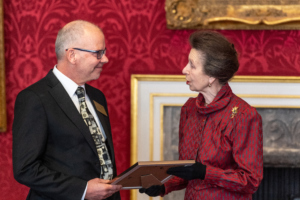ANDREW BAILIE (Youth Justice Agency of Northern Ireland)

ANDREW BAILIE (Youth Justice Agency of Northern Ireland)
COMMENDEE 2022-23: Praised by colleagues, and the families of the young people in his care, as “a first class social worker”, “brilliant”, and “an inspiration”, Andrew receives a Commendation for the skill and dedication he has brought to his work in Northern Ireland’s Youth Justice Agency over almost four decades.
Andrew’s initial nominator, line manager, and Youth Justice Agency Assistant Director Kelvin Doherty says he wrote the nomination while Andrew was leading a Duke of Edinburgh Award Scheme practice expedition in County Down’s beautiful Mourne mountains. He adds that Andrew is a Youth Justice Practitioner with over 35 years’ experience who makes ‘a huge difference’ in the lives of young people and parents, ‘tirelessly’ supporting ‘some of the most vulnerable and complex young people in the justice system’. And for the last decade he has also co-led the Agency’s parenting support group.
Butler Trust Local Champion and Director of Youth Justice Services at Northern Ireland’s Youth Justice Agency, Mary Aughey, shared further testimony, from one parent calling Andrew a ‘brilliant guy’ to another saying Andrew had taught him ‘so many different strategies to deal with situations regarding my daughter.’ A grandparent called Andrew ‘always so positive and reassuring’ and someone who was there for his grandson ‘when things were tough.’ Meanwhile a colleague praised Andrew’s gift for instilling the value of ‘if you can’t always do the right thing then do a kind thing’, and called his work an ‘inspiration’.
Mary has personally worked with Andrew for 20 years, and been his Director for 10, and says that at ‘a conservative estimate’ he has worked with ‘around 2000 children in conflict with the law and crucially almost the same amount of families.’ Meanwhile, as a qualified instructor and champion for the Duke of Edinburgh Award Scheme, Mary says he often runs ‘practice expeditions with some of our most difficult young people who would not otherwise engage in the Award’, adding that with his supervision ‘many of our young people have attained a Bronze Award, most of whom have never attained a certificate or recognition for anything before.’ He is also fundamental to organising ‘Celebration of Success’ events where children receive their certificates looked on by their proud parents. She concludes by calling him ‘a first-class social worker.’
Stephen Martin is the Chief Executive of Northern Ireland’s Youth Justice Agency, and reports hearing first hand heard from families about Andrew’s impact at the launch of an Ulster Folk Museum exhibition – the culmination of a project Andrew co-led. Called ‘Changing the Script’, it used art and memory ‘to engage and support the families of young people in the justice system.’ And ‘over and over again’, says Stephen, he and the Justice Minister heard parents saying Andrew’s work meant they felt they weren’t alone, they understood and could support their child better, and ‘this became my safe haven’.
Andrew himself notes that ‘the needs and risks’ involved ‘are complex’, and ‘inter-generational difficulties, through trauma and adverse childhood experiences, have impacted to create layers of need and hurt and harm.’ In response, he says he aims to bring to each interpersonal contact ‘an attitude that is open, receptive, non-judgmental and authentic’, but one that also ‘leaves room for humility!’ He adds that a degree of humour helps, too, alongside ‘energy, enthusiasm [and] achievable targets’.
He points out that the Duke of Edinburgh Award Scheme offers young people:
‘an opportunity to experience a variety of locations, to forge and be part of a group dynamic, as well as a hint of adventure – a specification list that applies to me as an instructor too. Inevitably different groups present their own challenges for me – from extremes of reluctance, short attention spans, crises of self-confidence to managing those with boundless energy and propensity for risk taking. How to enable them to undertake an enjoyable activity in a safe way is part of my job and responsibility.
A day on the hill or on the water in a canoe affords valuable time to get to know a young person in a situation where vulnerabilities can be exposed beyond the demands of the physical activity. Readiness to share my own vulnerability – ‘I’m tired too’ – can be a joining and respectful levelling. I have learned that modelling appears to be as influential as direction! For the duration of a walk I often learn more of a young person’s life history. In this way the activity becomes a connector for meaningful engagement and future work.’
Like so many Butler Trust winners, Andrew reflects on and praises his colleagues, saying ‘my ability to work effectively, safely and enjoyably is enabled by my colleagues, line managers and of course the young people and their families. It is from them that I derive inspiration, validation and appreciation on a daily basis.’ He concludes with an inspiring remark:
‘Whether up a mountain, in a kitchen, standing, walking, driving, where [relationships] can be fostered, restored, renewed and developed there can be no greater job satisfaction.’
